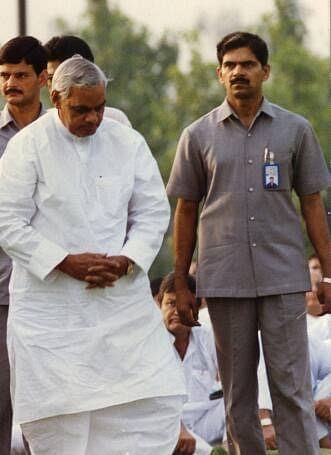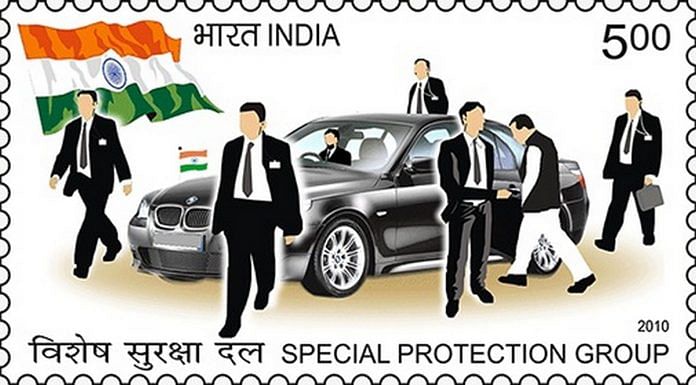As the election campaigning heats up with only around two weeks remaining before the last phase of the polls, there is one organisation that is going through its most trying times: the Special Protection Group (SPG), created after the unfortunate assassination of former prime minister Indira Gandhi, tasked with providing security to the prime minister.
This elite organisation was also entrusted with the security of former prime ministers and their family members for about 15 years after the tragic assassination of Rajiv Gandhi in 1991.
The SPG, under the control of cabinet secretariat, is a fully deputationist organisation, in the sense that all its personnel are drafted on deputation from various police organisations of both Centre and states. The best of these organisations are picked up, that too when they are at their best— young but trained and sufficiently experienced. These personnel with impeccable integrity and outstanding professional profile are then specially trained and equipped before inducted into the SPG.
The organisation has been headed by a galaxy of outstanding police officers with stellar careers. Even minor lapses on the part of members of the organisation are not condoned and the defaulters are promptly repatriated to their parent departments. Considering the whole spectrum of our internal conflicts, terrorist networks and their malevolent ingenuity in striking repeatedly, no price is too high in protecting the prime minister and there is no room for any error.
The unique method of tying up all loose ends and working out minutest details of the tour and functions are carried out during advance security liaison. Nothing is left to chance and all conceivable contingencies are taken into account and security drills worked out well in advance, including various contingencies and evacuation plans, etc.
It is a team work and there is no “I” in team work. The blame cannot be apportioned solely to a single agency, though it can surely be said in its 38 years of existence that the SPG has given an excellent account of itself.

Also read: How the SPG Act destroyed the Congress party
Not an easy task
Providing foolproof security to the prime minister is not an easy task, considering the involvement of foreign countries, including non-state players and evolving geopolitical situations in India’s neighbourhood and elsewhere turning into potential source of threat. The overall security scenario in the country is also far from normal.
The vitiated general security environment puts heavy pressure on the security architecture and it is not always in perfect shape in all states. During elections, cracks appear while threat perceptions continue to remain very high.
It is here that the SPG has to pitch in to make the team stronger and coordination perfect at all places. The assassinations of MK Gandhi, Indira Gandhi (an incumbent prime minister), and Rajiv Gandhi (an ex-prime minister) have shamed the security set-up of the nation beyond description and the SPG, raised solely to protect the prime minister and empowered sufficiently, has no option but to perform with perfection.
Howsoever great the threat in a democracy like ours, the movements of the prime minister cannot be restricted. Such a notion of security will never be accepted. The prime minister, a mass leader of the largest democracy of the world, cannot be expected to remain isolated and insulated from the public. He or she needs to address people, mingle with them, attend several meetings and other functions especially during election times. It is a season of exceptions and flexibility may have to be adopted without compromising on the fundamentals.
Narendra Modi, in the wake of the consecration ceremony in Ayodhya, is riding a wave of popular support and unprecedented adulation from some sections of society. The protectee is not only the prime minister but also the supreme leader of the ruling party, a star campaigner, and a great crowd-puller.
Every NDA candidate wants him to campaign in his or her constituency regardless of adverse factors. He crisscrosses the length and breadth of the country, attending roadshows and addressing multiple meetings.
These are the challenges the SPG is facing deftly. There is tremendous pressure from local leaders/organisers for all kinds of mass contact and the prime minister himself will be inclined to oblige, as the ultimate outcome of the elections decides his own political destiny.
The protectee, his advisors, the organisers of various functions, party men and the public at large need to be sensitised about requirements of security, some of which may look absurd to the ordinary eye. What is at stake is not merely the life of an individual leader but the survival of the whole democratic system and the destiny of the most populous country of the world.
Also read: What is the Special Protection Group and why Manmohan Singh’s security cover was removed
Time-tested methods
The SPG, over a period of time, has been successfully able to adopt some of the best security practices from all over the world and also adapt and accommodate maximum requirements of the protectee as a public figure of a democratic dispensation.
Each prime minister has a different style of functioning. It is reflected in his or her public dealings as well. Some would go by the rule book, some get swayed by the mood of the public and become unstoppable. From my own personal experience, I can say that PV Narasimha Rao would always go by the advice of the security team while it was difficult to restrict HD Deve Gowda, who succeeded Rao after a fortnight. Once the security drills are breached, the Close Protection Team (CPT) has to ensure the protectee’s exposure is minimised to a few seconds, and that too in an unpredictable manner.
The founding members of the organisation and the successive top leadership have created fine ethos and superior standards in handling unforeseen operational and medical contingencies. The most remarkable organisational trait I experienced in SPG is the professional freedom and functional space available once deputed on a task. It is the least hierarchical organisation where even junior functionaries enjoy reasonable functional autonomy thanks to its work culture where role is more important than the rank.
The SPG’s operational philosophy is based on low profile, unobtrusive methods; it never invokes deterrent postures. It tries to keep the potential threat away from the protectee, merges with the surroundings without becoming part of it, and always anticipates the unforeseen. How many attempts have been deterred or foiled is hard to assess and harder to explain to the public just as some of the seemingly rigid insistence on security precautions and restrictions that the SPG is forced to place on the organisers and sometimes even on the protectee.
The soundness of these security doctrines is time-tested but the brave people performing the onerous task should never fall into the rut of routine, for the adversaries are also smart, tech savvy, and have the time to keep repeating their malicious attempts. They can fail but we can’t.
KV Madhusudhanan is a former Inspector General of the CRPF who remained on long deputation with the SPG, heading the Close Protection Team (CPT) of four successive Prime Ministers. Views are personal.
(Edited by Prashant)



